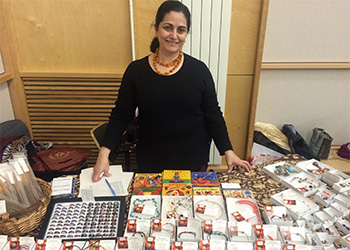Last year, the Government of Canada promised to increase the country’s Syrian refugee intake to 25,000 individuals.
This past Tuesday, students at the School of Social Work at pilipili¬ĢĽ≠ presented a public lecture entitled ‚ÄúSyria: The Land, The Culture, The People‚ÄĚ to break down the preconceptions some might have about what the influx of Syrian immigrants might mean for Canada.
The event, with financial support from the President's Office and community radio station CKDU, provided an opportunity to continue the dialogue surrounding inclusivity and diveristy, especially in terms of welcoming newcomers to Canada. Donations were also collected at the event to support Abdulwahab Jalab, a displaced Syrian student currently residing in South Korea but who has been accepted into Dal Engineering this fall; the money raised aims to support his ability to study in Canada.
‚ÄúWe want to acknowledge that sometimes when people get the label of ‚Äėrefugee,‚Äô we don‚Äôt really get to see them as a whole person,‚ÄĚ said Gina Kokoska, student in the School of Social Work and the event‚Äôs MC. ‚ÄúTonight, we encourage everyone to look beyond the label.‚ÄĚ
 Making a home in Nova Scotia
Making a home in Nova Scotia
The evening began with its speaker, Maha Nabhan. Originally from Damascus, Syria, Nabhan chose to call Nova Scotia home in 2012. She established a jewellery business with her sister, Mai (left), called Inana Jewels. Pieces of handmade Inana jewellery were for sale at the event, with 50 per cent of sale proceeds to be donated towards Syrian students at Dal.
Outside of the jewelery business, Nabhan is a mathematician by training, with her PhD in the field, and is a Fulbright Scholar who has worked professionally in her field for over 20 years between the United States, Syria and Qatar.
‚ÄúFive years, and maybe the only thing you hear about Syria is the war, the refugees, the Syrians drowning in the Mediterranean Sea and about ISIS,‚ÄĚ she said. ‚ÄúToday, I‚Äôm not going to talk about that. I‚Äôm going to talk about Syria before the war.‚ÄĚ
Nabhan presented the audience with a very informative lecture, providing an authentic portrait of Syria that is often lost in the media today. She discussed the country’s diversity through various languages, ethnicities and religions, showed colorful photos of clothing and artwork, and played clips of traditional Syrian music.
Her lecture allowed the audience to understand how Syrian culture plays a role in their daily lives, although they may not know it. She discussed how over 3,000 English words have Arabic roots, that Arabic is the most common unofficial language spoken in Nova Scotia, and finished her presentation by showing photos of famous people with Syrian heritage, including Jerry Seinfeld and Steve Jobs.
Local connections and support
Following Nabhan’s lecture, the event featured a panel discussion and Q&A with representatives from Immigrant Services Association of Nova Scotia (ISANS) and the Halifax Refugee Clinic.
Also on the panel was, Yaser Alkayale, current president of the new Dalhousie Syrian Student Society. Yaser arrived with his family in Canada 10 years ago, and he is currently a second-year Computer Science student at the unviersity. He reflected on his experiences as an immigrant several years ago, commended the organizations in place to aid newcomers in their transition and expressed his support for all new Syrian refugees.
‚ÄúWhen I first arrived, it was super difficult to adapt because there were not a lot of Syrian people here at that time,‚ÄĚ he said. ‚ÄúI think it‚Äôs a lot better now and a lot easier. There are more people willing to help, several churches and mosques and a big support network.‚ÄĚ
ISANS representative Mohja Alia spoke to this support network, outlining the work that her organization does including assessment, language training, employment counseling and other transitional services.While finding employment with the language barrier is a primary challenge newcomers face, government funding is helping ISANS to develop customized training strategies to knock down these barriers. She encourages employers to look beyond the Canadian credentials and recognize the knowledge that comes from other places, as many newcomers are extremely skilled in fields of law, engineering, farming and carpentry.
‚ÄúThey are humble and they are so happy to be here,‚ÄĚ she said. ‚ÄúWith our help, they‚Äôre going to make Nova Scotia stronger.‚ÄĚ

